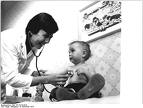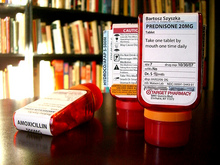Articles Posted in Pharmacy Error
Medical Errors: A Few Steps To Keep In Mind To Help Avoid Physical Injury And Emotional Pain And Suffering
 Today we would like to briefly discuss some of the steps you can take to avoid medical errors, in general. Although we help victims of medical errors seek justice and compensation, the best solution is to be informed, so you can avoid ever needing an attorney due to a tragic experience caused by medical error.
Today we would like to briefly discuss some of the steps you can take to avoid medical errors, in general. Although we help victims of medical errors seek justice and compensation, the best solution is to be informed, so you can avoid ever needing an attorney due to a tragic experience caused by medical error.
Medical errors can leave you or a loved one with severe physical injuries and emotional pain and suffering. As you know, medical errors can happen in a variety of places such as hospitals, clinics, out patient surgery centers, doctors’ offices, nursing homes, pharmacies and patient homes. On this blog, we have written about prescription errors, physician errors, nursing errors, and dental errors, to name a few. And these errors typically involve medicines, surgeries, diagnosis, and lab reports. Now we would like to discuss a few steps you can take to help avoid medical errors.
Many medical errors occur when doctors and their patients do not communicate effectively. In fact a recent study supported by the Agency for Healthcare Research and Quality found that doctors need to help their patients make informed decisions. Patients who are uninformed will logically be more susceptible to making errors regrading their medical care. So what can you do:
1. Be involved in your healthcare treatment– This could be the single most important thing you can do: participate, be an active partaker in all decisions that affect your health. Research shows that being active in your health care treatment leads to better results.
2. Make sure that you inform your doctor about all medications you are taking, including herbal remedies, vitamins, and over-the-counter drugs.
3. Make sure your doctor knows about any allergies or adverse reactions you have had to certain medications. This will help avoid prescription errors, doctors giving you the wrong medication.
4. When your doctor writes you a prescription, make sure you read it. Too many times, we pass off illegible prescriptions as “doctor talk.” You must ensure that you read the prescription given to you and that you understand it. Think about it: if you can’t read your doctor’s handwriting, there is a good chance, your pharmacist may not be able to read it either.
5. When you receive your medication from your pharmacist, double check, by asking if the medicine you are being given is indeed the medicine your doctor prescribed. The last thing you want is the wrong medication.
6. Read the label on your medication before you leave your doctor’s office or the pharmacy. If you don’t understand how to take your medication, ask the pharmacist or your doctor.
7. Ask for written information about the side effects that your medication may cause.
8. Regarding hospitals, you should consider choosing a hospital that has treated many patients affected by your same illness. You should also consider asking anyone who comes in direct contact with you, to wash his or her hands (bacteria infection can cause serious illness).
9. When you are discharged from a hospital, ask the doctor to explain your treatment plan.
10. How new is the doctor who is treating you? (Regardless of whether he or she is an emergency room doctor or in-patient doctor.)
We’ve come across a recent article that talks about how “greenhorn” doctors (“newbies”) have casued a serious spike in “fatal medication errors” throughout the United States. A recent study found that in counties with “teaching” hospitals, fatalities due to medication errors spiked each July, the same month that new doctors begin their residency.
Regrettably, even after taking some of the above-mentioned precautions and more, people will still be the victims of medical error. If you are one of those unfortunate people, call Williams Oinonen LLC today, because we will represent your case with zeal and ethics, with a view towards doing what’s best for you, always.
Continue reading →
Georgia Pharmacy Errors: Did Your Pharmacist Give You The Wrong Medication?
 Throughout the country, prescription misfills injure and sometimes kill hundreds of people, every year. As pharmacies become busier, the likelihood of pharmacy error increases. In 1998, Georgia took action to combat this problem. The Georgia Legislature strengthened laws and regulations regarding pharmacy conduct. Nevertheless, many people throughout Georgia continue to receive the wrong medication due to pharmacy error. Once you or a loved one has become a victim of pharmacy error, the question becomes: how do I maximize my recovery for the injuries I have suffered? The answer is not as simple as you may think.
Throughout the country, prescription misfills injure and sometimes kill hundreds of people, every year. As pharmacies become busier, the likelihood of pharmacy error increases. In 1998, Georgia took action to combat this problem. The Georgia Legislature strengthened laws and regulations regarding pharmacy conduct. Nevertheless, many people throughout Georgia continue to receive the wrong medication due to pharmacy error. Once you or a loved one has become a victim of pharmacy error, the question becomes: how do I maximize my recovery for the injuries I have suffered? The answer is not as simple as you may think.
In Georgia, each pharmacist has an obligation to ensure that every prescription given to you is accurate. That means that the pharmacist must review the prescription (with a few minor exceptions). The pharmacist is also responsible for all decisions regarding your prescription that require “professional judgment.” For example, if you were to ask about a recent change in the color of your medication or about how your medication may interact with a current medication you are taking, the pharmacist–not the technical assistant–is responsible for answering these questions.
Furthermore, many physicians write your prescription in what seems like another language. Regardless, the fact that a prescription seems illegible is not an excuse for giving the wrong medication. By law, the pharmacist must call the prescribing physician to verify what your prescription is!
But merely receiving the wrong medication will not solely determine your recovery. You must be injured, and your injury must be provable, because the extent of your injury (for example medical bills, rehabilitation, and loss wages) will play a signiifcant role in your recovery process. Unfortunately, your recovery will also depend on another important factor: Were you at fault? And if so, to what degree was your fault?
Our experience has demonstrated that maximizing a victims recovery in prescription-error cases inevitably involves what Georgia law refers to as comparative fault–the extent of your fault in taking the wrong medication. For example, a few questions in the minds of insurance adjusters and probably jurors may be: how long have you been taking the medication you were supposed to receive? If you have been taking a particular medication for, say, 5 years, and your medication is a small red pill, then, when the pharmacist made an error by giving you a big orange pill: why did you take it? Didn’t the color warn you of a potential problem? That sounds unfair and it is; you did not make the mistake. But the harsh reality is that Georgia law permits insurance companies and juries to take into consideration the extent of your so-called “fault,” when deciding what compensation will be given to you for your injuries.
Lastly, in order to maximize your recovery, you need a lawyer who understands punitive damages, which is an amount of money given to you, as a way of punishing the wrong doer (in this case, the pharmacy) to deter future, similiar conduct. Punitive damages are not easy to recover. In fact, to recover punitive damages in Georgia, proving mere negligence or even gross negligence is not enough. That means that merely giving you the wrong medication will not help maximize your recovery, at trial or during negotiations. In the context of pharmacy error, your lawyer will most likely have to prove a complete “want of care” on the part of the pharmacy. This is tough. But a lawyer with pharmacy-error experience and strong legal skills definitely increases your chances of maximizing your recovery. Ultimately, everything will depend on an in-depth understanding of how the facts and evidence of your case apply to Georgia law.
Continue reading →
 Georgia Injury Lawyer Blog
Georgia Injury Lawyer Blog

